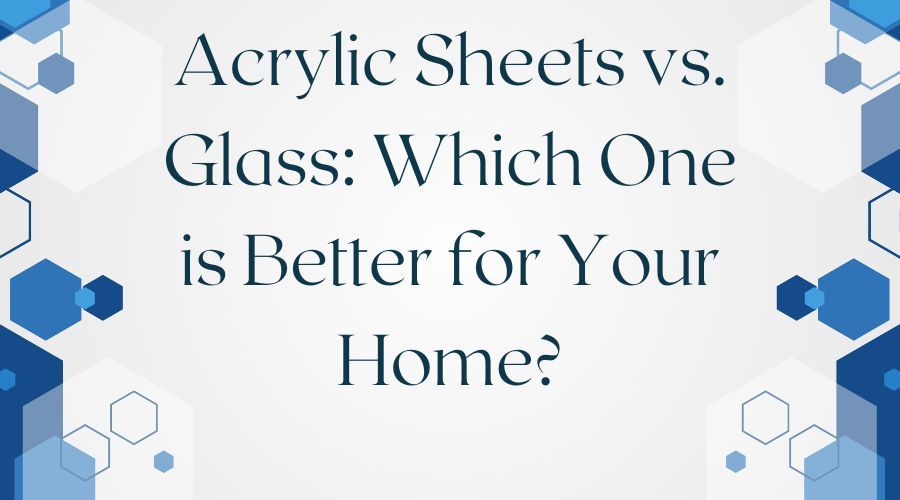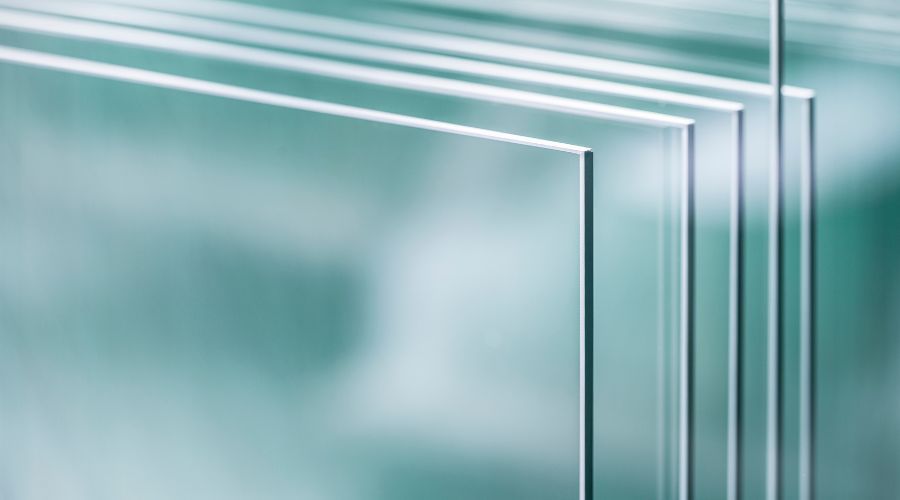
Regarding home décor and improvement, the materials you choose can make all the difference. The most important judgment you have to make is whether to go for acrylic sheets or glass. Both materials have advantages and disadvantages, so it's important to weigh them carefully and make an informed decision.
This article will compare acrylic sheets and glass and help you decide which is best for your home. From their durability and cost to their aesthetic appeal and maintenance requirements, we'll cover everything you need to know.
Acrylic sheets, also known as plexiglass, are made from a thermoplastic material that is transparent and shatter-resistant. Listed below are the pros and cons of using acrylic sheets in your home.
Acrylic sheets are much more durable than glass and can withstand impact without cracking or shattering. They are 17 times stronger and less than half the weight of glass, These are great options for places that have a lot of foot traffic and households with kids and pets.
Acrylic sheets have a modern, sleek look that can instantly enhance the appearance of any room. They are available in many varieties of colors and finishes, including frosted, textured, and mirrored.
Acrylic sheets are safer than glass as they do not shatter into sharp, dangerous pieces. If an acrylic sheet does break, it will fracture into large pieces with rounded edges, reducing the risk of injury.
Acrylic sheets provide better insulation than glass, keeping your home cool in the summer and warm in the winter. They are also more energy-efficient, helping you save on your energy bills.
Acrylic sheets are more affordable than glass, for homeowners on a budget, this is an excellent option.
Acrylic sheets are more prone to scratches than glass, which can affect their appearance over time. However, minor scratches can be easily buffed out with a polishing kit.
Acrylic sheets are not as resistant to UV radiation as glass and can turn yellow or fade over time if exposed to direct sunlight.
Acrylic sheets require regular cleaning and maintenance to prevent scratches and maintain their clarity. They should be cleaned with a mild soap, water solution, and a soft cloth.

Glass is a popular material for windows, doors, and furniture due to its clarity and timeless appeal. Here are the pros and cons of using glass in your home.
Glass offers superior clarity and does not yellow or fade over time. It is an ideal material for windows, doors, and furniture as it allows natural light to filter in and brighten up any room.
Glass has a classic, timeless appeal that never goes out of style. It is available in a range of textures and finishes, including frosted, etched, and stained, making it a versatile material for any home.
Glass is easy to clean and care for, requiring only a simple solution of water and vinegar or a commercial glass cleaner. It does not scratch easily, making it an ideal choice for homes.
Glass is highly resistant to UV radiation and will not yellow or fade over time if exposed to direct sunlight.
Glass is fragile and can break easily, posing a safety risk if it shatters into sharp, dangerous pieces. It is not recommended for high-traffic areas or homes with children and pets.
Glass is much heavier than acrylic sheets, making it more difficult to install and transport. It also requires thicker framing and support, adding to the overall cost.
Glass is more expensive than acrylic sheets, making it a less affordable option for homeowners on a budget.
The response to this question depends on your specific needs and preferences. Acrylic sheets are more durable, cost-effective, and safer than glass, making them ideal for high-traffic areas and homes with children and pets. Glass, on the other hand, offers superior clarity, a classic appeal, and is easy to clean and maintain.
Acrylic sheets are more prone to scratches than glass, but minor scratches can be easily buffed out with a polishing kit.
No, acrylic sheets provide better insulation than glass, helping to keep your home warm in the winter and cool in the summer. They are also more energy-efficient, helping you save on your energy bills.
Yes, acrylic sheets are not as resistant to UV radiation as glass and can yellow or fade over time if exposed to direct sunlight.
Yes, glass is more expensive than acrylic sheets, making it a less affordable option for homeowners on a budget.
|
Feature |
Acrylic Sheets |
Glass |
|
Fragility |
Strong and shatter-resistant |
Fragile and prone to breaking |
|
Weight |
Lighter weight compared to glass |
Heavier than acrylic |
|
Clarity |
More transparent than glass |
Transparent, but can have some tints |
|
Reflectivity |
Less reflective than glass |
Reflective, especially when using clear glass |
|
Scratches |
Prone to scratching, but can be easily polished |
Resistant to scratches and scuffs |
|
UV Protection |
Available with coatings that offer UV protection |
Moderate UV protection, but can also be coated for better protection |
|
Transportation |
Easy to transport due to its lightweight and durability |
Heavy and may require extra support for transportation |
|
Cost |
Typically, more expensive than glass, but less expensive to ship |
Less expensive than acrylic, but more expensive to ship |
Choosing between acrylic sheets and glass for your home is an important decision that requires careful consideration of the pros and cons of each material. Acrylic sheets are more durable, cost-effective, and safer than glass, making them ideal for high-traffic areas and homes with children and pets. Glass, on the other hand, offers superior clarity, a classic appeal, and is easy to clean and maintain.
Ultimately, choosing between acrylic sheets and glass will depend on your specific needs and preferences.